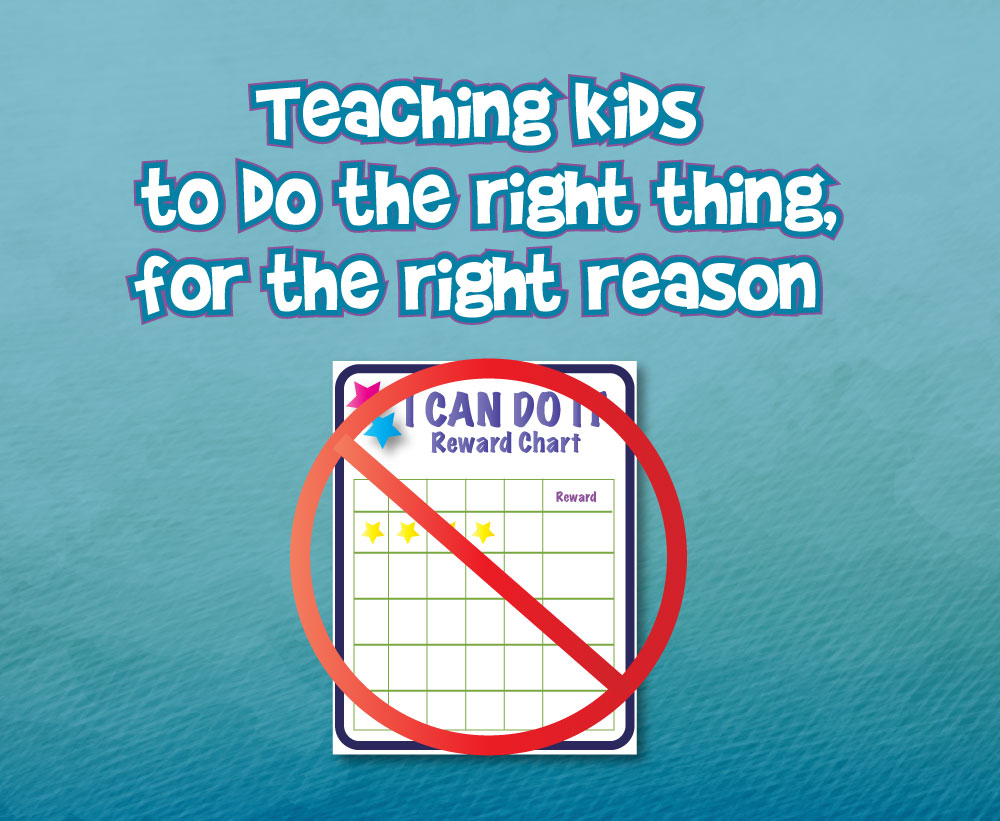Teach kids to make the right choices for the right reasons
SEL Techniques

I've sworn off rewards charts. I want my kids to choose to do the right thing, not for some meaningless reward, but because it's the right thing to do.
Rewards-based discipline is everywhere these days. (2022 updated: I originally wrote this blog years ago, when self-esteem based strategies were still popular in elementary schools. Some districts have moved away from this approach by now.) I figured out at one point, my daughter was spending every Friday afternoon at school watching movies. I’m not talking about those horrid educational movies they showed us when we were kids. (Anyone else remember The History of Cranberries? ) I’m talking Disney. DreamWorks. Nickelodeon.
Why was every single Friday afternoon an in-school
vacation day? ... Because she had finished her work. Um, isn’t
she supposed to finish her work? The school policy was that the children who had finished their work for the week could spend Friday afternoon watching movies. At the end of the
year, she got another award for having finished her work every week. I had trouble congratulating her for getting to watch movies for 10% of the entire school year and then getting another award on top of it. It was getting out of hand.
We're teaching kids the wrong motivation
I understand the need for incentives. For some tasks or accomplishments, rewards and rewards charts are appropriate motivation for kids. But the practice has gotten so pervasive, we aren’t teaching kids to make good choices for the right reasons. They are learning how to make a good choice to get the reward, instead of making a good choice because it feels good to do the right thing.
Why I swore off rewards charts
One day I banned all rewards charts from my house. I considered a massive bonfire ceremony, but settled instead for a huffy lecture about making good choices for the right reasons. What was the straw on this camel’s back? For a few days in a row, my kids were bickering and constantly being mean to each other. In an attempt to help them see how negative they were being, I told them that for every negative comment they made, they’d lose a point. For every positive comment or action, they’d gain a point. At the end of the day, whoever had the most points would win something. I didn’t even tell them what they’d win. It didn’t matter.
Instantly, one of my children started saying nice things to one of the others. There were outrageous compliments (Really? You’ve always admired the color your brother chose for his room?). I even heard one offer to do another's chores. But here’s the thing. It wasn’t sincere. It wasn’t being done out of some epiphany about being kind. It was about the points. It was about the prize.
Making good choices for the right reasons
From that day forward we had a new policy in the house. We would make a good choice because it was the right thing to do. And we would relish the feelings that came with having made a choice we were proud of. As parents, we would pay more attention to the motivation or intent behind the kids’ choices than the surface-level show of it.
To support this new policy, we made a point of helping the kids notice how they felt when they made bad choices, and how they felt when they made good choices.
- When they made a bad choice and were sad, we applauded them for noticing the signals their conscience was sending. We encouraged them to remember how tight their hearts felt and how disappointed they were—because that is what would keep them from making the same mistake twice. We taught them not to dwell on the bad feeling, but to learn from their experiences and use it to help them choose better next time.
- When they were in a challenging or tempting situation but did the right thing, we hugged and celebrated how good they felt. We talked about how their heart soared and how they felt proud for having done the hard—but right—thing.
Of course, they still made mistakes. They still had moments of success and failure. But along the way, they learned to be honest with themselves about their motivation, and they learned to take responsibility for their own actions. They weren't perfect then and they're not perfect now. But they started coming home from school to proudly tell me occasions throughout the day when they could’ve made a bad choice, but instead made a good choice. And they were so proud of themselves for it. That's better than any rewards chart.
Colleen Doyle Bryant
Colleen Doyle Bryant is the author of five books and more than 50 learning resources about making good choices for the right reasons. Her Talking with Trees series for elementary students and Truth Be Told Quotes series for teens are used in curricula around the world. Rooted in Decency, Colleen’s most recent release, written for an adult audience, explores how the decline in common decency is affecting wellbeing, and how we can build more trust and cooperation. Learn more at ColleenDoyleBryant.com






